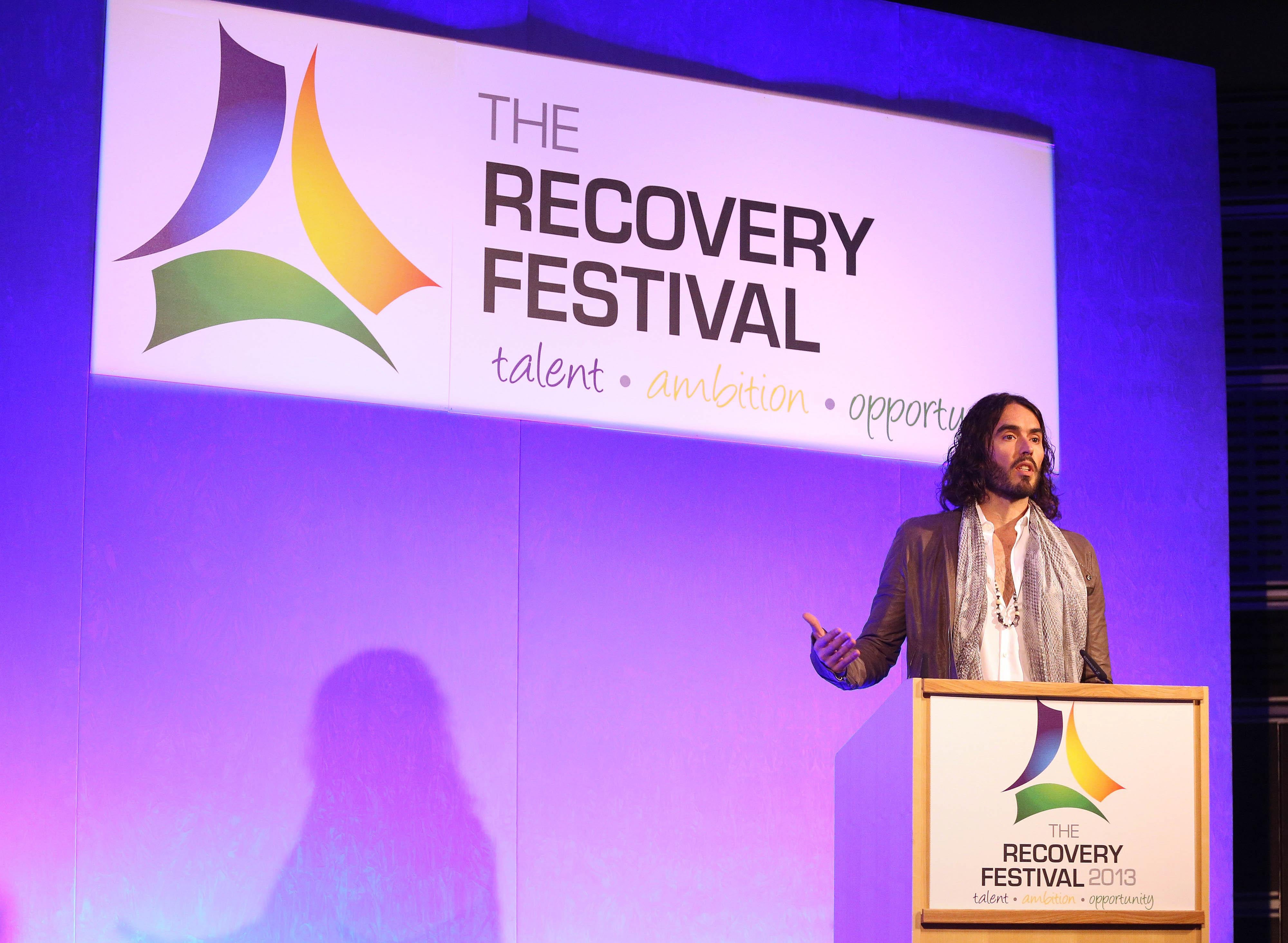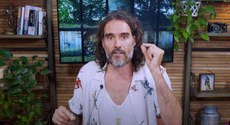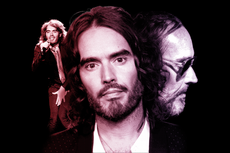‘I confronted Russell Brand about his behaviour years ago – he had no regrets’
When she challenged him six years ago about his sexual exploits, Katie Glass found the newly styled guru utterly lacking in self-awareness and contrition. What he told her revealed everything we know about how he sees women – and what is flawed about the age of consent


I was not a 16-year-old schoolgirl when I went to interview Russell Brand six years ago. I was a professional woman in my thirties, a journalist from a national newspaper doing my job. When I arrived, I shook his hand. When I left – after he’d complimented my “Malteser” eyes – he offered me a cuddle, an exchange that reveals a lot about how Brand sees women. The tip of a misogynist attitude, which I wanted to confront him about. But then, as now, the only victim he recognised was himself.
Today, Brand faces very serious and specific allegations of rape and sexual assault from a number of women and the police have begun inquiries. As the investigation into him takes place it bears all the signs of a comedy MeToo moment. But as Brand’s supporters claim he is innocent until he is tried in a legal forum, a larger cultural shift is taking place of women who want a wider discussion about consent and who – like me – think the age-old defence that “if nothing illegal happened then there is no problem” no longer cuts it.
Brand has refuted the sexual assault allegations, characterising them as a coordinated attack by mainstream media, he has argued his relationships were always consensual and his promiscuous past was something he’d always been open about. It is an admission, for me at least, which takes on new meaning when viewed in the context of an old stand-up routine where he jokes about liking women to give him oral sex that left them choking and their mascara running. A description, echoed by a woman called “Alice”, who told the Dispatches investigation team how Brand forced his penis into her 16-year-old mouth: “I couldn’t breathe, he was just choking me. I was crying and he said, ‘Oh I only wanted to see your mascara run anyway,’” she said.
When I interviewed Brand in 2017, he had just married, had become a father for the first time and was at the beginning of restyling himself – from debauched comedian to newly enlightened self-help guru. Gone was his trademark eyeliner and in its place a man bun. He was promoting a tome called Recovery: Freedom From Our Addictions – a book inspired by the 12 principles of Alcoholics Anonymous.
Brand’s sexual exploits were well known by then. He’d boasted about how often he’d used prostitutes from the age of 16 and described getting through 80 partners a month, telling one interviewer in 2010: “I was having sex with different women three, four, five times a day. It was bacchanalian. In Ireland, nine in one evening… The fame and kind of will that I had meant that, instead of taking someone for a date and then going to the pictures and then calling them, I was able to go, ‘Let’s do sex right now!’”
In his second memoir, Booky Wook 2 – published in 2010, after The Sun had named him “Shagger of the Year” three years in a row – he described an orgy at his house as “four in the bed, two in the kitchen, three in the hot tub and still the doorbell rings”. In Recovery, the book I was talking to him about, he had written: “Every single pleasure-giving thing that’s come my way has been grabbed and guzzled and fondled and f***ed.”
It struck me there appeared to be some serious smoke and mirrors going on. How did his new “woke” reinvention sit alongside his open history of using and discarding women, and deploying crass language about them? Were we supposed to just accept him as a newly changed man when he barely registered that the numbers of sexual conquests he casually boasted about were actual human beings?

Given that the premise of his new book was how he had used the 12-step programme for sex addiction, I asked him if he had completed steps eight and nine, which required compiling a list of everyone he had harmed and making amends to them? How many people were on his list? I asked. “Quite a lot,” he said. “Hundreds?” “Not hundreds,” he replied, apparently surprised I would think that. He then garbled an excuse about how “there is a degree of self-preservation in undergoing this process because of my obligations as a celebrity”.
He prickled at my suggestion that given the grim way he spoke about his encounters with women, he might be a misogynist: “I have something in me, but I’m basically quite soft and loving,” he insisted, “I’m not like a person that likes to hurt or humiliate people… But what I am is a bit greedy. You know, so I like flesh, you know. I like carnality. And I like sex… No other primates are monogamous. Right. I was thinking like that. And these women all want to have sex with me – let’s go.”
He insisted then, as he has since, that all his relationships were consensual. No one was “tricked or inveigled or bribed”. Unwilling to explore the vast grey area around sexual encounters, he did at least acknowledge that sex and power are closely entwined.
He prickled at my suggestion that he might be a misogynist: ‘I have something in me, but I’m basically quite soft and loving,’ he insisted, ‘I’m not like a person that likes to hurt or humiliate people… But what I am is a bit greedy.’
“When it comes to relationships between the genders, I think that what's more important is power rather than sex,” he admitted. “And do you see, there’s quite a lot of little strands that have got to come together here – oh, promiscuity is about sex; sex is about power – and I’m saying, well, I don’t know; with my particular sexuality, it felt like it was about connection and yearning, rather than 'Oh, better subjugate another five women today.' It was much more about 'Love me, love me, come close to me, come close to me.' It’s a wanting... it’s sort of the power of knowing you’re not ugly or something. But for me it is very much like… 'Ahh! Connection.' Rather than subjugation. Do you see what I mean?” Reading the transcript of our interview back today, I wondered how the women who appear in the Dispatches documentary would have felt hearing those words.
When I asked what his greatest regrets were from the time he was an addict, he surprised me by saying. “I don’t have any.” For anything? “Nothing,” he said. He didn’t regret the way he’d used and spoken about the women he’d slept with. Or apparently regret the fact that, as we now know, a woman called Nadia, who featured in the Dispatches documentary, wrote to him after she alleges he raped her without a condom when she went to his LA home telling him how he “completely broke her down”.
For a man who claimed to be reaching for a greater truth and had hours of therapy, he seemed to me to be astonishingly un-self-aware. Perhaps now the reason for those mental gymnastics is clear. He simply didn’t want to go there.
At the crest of Brand’s fame, I was a showbiz reporter. I sometimes encountered him out on the town and witnessed first hand his sexual confidence. At one party where Amy Winehouse was performing, I watched him sweep backstage to flirt with the make-up girls. Typically, it was the juniors who were the objects of his affection, little did I know that he had already dated a 16-year-old virgin, still at school.

It feels very telling to me now, but it is ultimately a story that is as old as time. The entertainment industry has been built on a history of exploitation of women – whether that is the Hollywood casting couch or the teenage groupies picked off by music “heroes” like John Peel, David Bowie and Jimmy Page. We now openly discuss how problematic they seem, but the lessons around consent and the power imbalance in relationships are still there to be learnt. Phillip Schofield described his encounter with a much younger colleague as “unwise but not illegal” and was roundly called out for it. But Russell and his supporters seem unwilling to even admit how unwise some of his liaisons were.
We have yet to see whether Brand will be arrested, charged, or legally convicted of the sexual assaults he is accused of. But those claiming his accusers should have gone to the police might at least admit that in British courts rape convictions are distressingly rare. We know too that while under British law the age of consent is just a number and, in the murky reality of sexual interactions, power imbalances are not insignificant and need to be addressed. In Sweden for example, although the age of consent is 15, it is raised to 18 if the other party is in a position of trust. A “close in age” clause means a distinction is made when the two parties are of similar age. So a 16-year-old sleeping with another 16-year-old is viewed very differently from a 16-year-old having a sexual relationship with a thirtysomething man. Let alone one with international fame.
For all his bombast about having found the truth in his era of supposed enlightenment, the impact Brand’s behaviour had on women still seems one reality he and his supporters are unwilling to face. Based on what I’ve seen so far I am fairly certain that, as on the day when we spoke, Brand still believes that he has done nothing wrong. Partly because he claims the law is on his side, and partly because of the way he has been enabled – by commissioners, colleagues and fans, who even this week gave him a standing ovation. In a way we all share the blame for enabling Brand – by buying his books, watching his TV appearances, and laughing at jokes he made about women that on some level we knew were problematic. Now, as more allegations of predatory behaviour emerge across the comedy industry, it is time for all of us to admit: the law alone does not have the monopoly on consent. A relationship can still be unwise even if it is not illegal and unless that is understood, Brand risks being just another name in a long list of men who got away with terrible behaviour just because they could.





